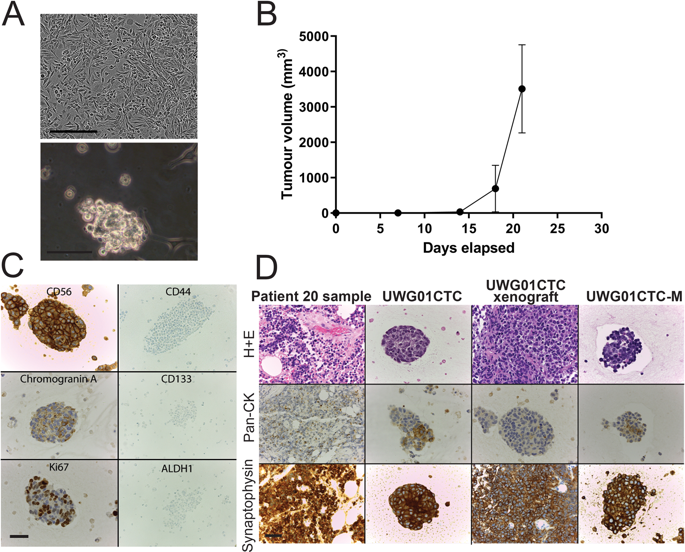Our official English website, www.x-mol.net, welcomes your
feedback! (Note: you will need to create a separate account there.)
Establishment of novel long-term cultures from EpCAM positive and negative circulating tumour cells from patients with metastatic gastroesophageal cancer.
Scientific Reports ( IF 3.8 ) Pub Date : 2020-01-17 , DOI: 10.1038/s41598-019-57164-6 Daniel Brungs 1, 2, 3, 4 , Elahe Minaei 1, 2, 4 , Ann-Katrin Piper 1, 2, 4 , Jay Perry 1, 2, 4 , Ashleigh Splitt 3, 4 , Martin Carolan 1, 3, 4 , Shantay Ryan 5 , Xiao Juan Wu 5 , Stéphanie Corde 1, 6, 7 , Moeava Tehei 1, 4, 7 , Morteza Aghmesheh 1, 3, 4 , Kara L Vine 1, 2, 4 , Therese M Becker 4, 8, 9 , Marie Ranson 1, 2, 4
Scientific Reports ( IF 3.8 ) Pub Date : 2020-01-17 , DOI: 10.1038/s41598-019-57164-6 Daniel Brungs 1, 2, 3, 4 , Elahe Minaei 1, 2, 4 , Ann-Katrin Piper 1, 2, 4 , Jay Perry 1, 2, 4 , Ashleigh Splitt 3, 4 , Martin Carolan 1, 3, 4 , Shantay Ryan 5 , Xiao Juan Wu 5 , Stéphanie Corde 1, 6, 7 , Moeava Tehei 1, 4, 7 , Morteza Aghmesheh 1, 3, 4 , Kara L Vine 1, 2, 4 , Therese M Becker 4, 8, 9 , Marie Ranson 1, 2, 4
Affiliation

|
Circulating tumour cell (CTC) enumeration and profiling has been established as a valuable clinical tool in many solid malignancies. A key challenge in CTC research is the limited number of cells available for study. Ex vivo CTC culture permits expansion of these rare cell populations for detailed characterisation, functional assays including drug sensitivity testing, and investigation of the pathobiology of metastases. We report for the first time the establishment and characterisation of two continuous CTC lines from patients with gastroesophageal cancer. The two cell lines (designated UWG01CTC and UWG02CTC) demonstrated rapid tumorigenic growth in immunodeficient mice and exhibit distinct genotypic and phenotypic profiles which are consistent with the tumours of origin. UWG02CTC exhibits an EpCAM+, cytokeratin+, CD44+ phenotype, while UWG01CTC, which was derived from a patient with metastatic neuroendocrine cancer, displays an EpCAM-, weak cytokeratin phenotype, with strong expression of neuroendocrine markers. Further, the two cell lines show distinct differences in drug and radiation sensitivity which match differential cancer-associated gene expression pathways. This is strong evidence implicating EpCAM negative CTCs in metastasis. These novel, well characterised, long-term CTC cell lines from gastroesophageal cancer will facilitate ongoing research into metastasis and the discovery of therapeutic targets.
中文翻译:

从转移性胃食管癌患者的EpCAM阳性和阴性循环肿瘤细胞建立新型长期培养物。
在许多实体恶性肿瘤中,循环肿瘤细胞(CTC)枚举和分析已被确定为有价值的临床工具。CTC研究的关键挑战是可供研究的细胞数量有限。离体CTC培养可扩增这些稀有细胞群,以进行详细表征,包括药物敏感性测试在内的功能测定以及转移病理学研究。我们首次报告了来自胃食管癌患者的两个连续的CTC系的建立和鉴定。两种细胞系(称为UWG01CTC和UWG02CTC)在免疫缺陷小鼠中表现出快速的致瘤性生长,并表现出与原发肿瘤一致的独特基因型和表型特征。UWG02CTC表现出EpCAM +,细胞角蛋白+,CD44 +表型,而UWG01CTC 它来自患有转移性神经内分泌癌的患者,显示出EpCAM-,弱的细胞角蛋白表型,并具有强烈的神经内分泌标志物表达。此外,这两种细胞系在药物和放射敏感性方面显示出明显的差异,这与不同的癌症相关基因表达途径相匹配。这是有力的证据表明EpCAM阴性CTC参与了转移。这些来自胃食管癌的新颖,特征充分的长期CTC细胞系将促进正在进行的转移研究和治疗靶标的发现。这两种细胞系在药物和放射敏感性方面显示出明显的差异,与差异的癌症相关基因表达途径相匹配。这是有力的证据表明EpCAM阴性CTC参与了转移。这些来自胃食管癌的新颖,特征充分的长期CTC细胞系将促进正在进行的转移研究和治疗靶标的发现。这两种细胞系在药物和放射敏感性方面显示出明显的差异,与差异的癌症相关基因表达途径相匹配。这是有力的证据表明EpCAM阴性CTC参与了转移。这些来自胃食管癌的新颖,特征充分的长期CTC细胞系将促进正在进行的转移研究和治疗靶标的发现。
更新日期:2020-01-17
中文翻译:

从转移性胃食管癌患者的EpCAM阳性和阴性循环肿瘤细胞建立新型长期培养物。
在许多实体恶性肿瘤中,循环肿瘤细胞(CTC)枚举和分析已被确定为有价值的临床工具。CTC研究的关键挑战是可供研究的细胞数量有限。离体CTC培养可扩增这些稀有细胞群,以进行详细表征,包括药物敏感性测试在内的功能测定以及转移病理学研究。我们首次报告了来自胃食管癌患者的两个连续的CTC系的建立和鉴定。两种细胞系(称为UWG01CTC和UWG02CTC)在免疫缺陷小鼠中表现出快速的致瘤性生长,并表现出与原发肿瘤一致的独特基因型和表型特征。UWG02CTC表现出EpCAM +,细胞角蛋白+,CD44 +表型,而UWG01CTC 它来自患有转移性神经内分泌癌的患者,显示出EpCAM-,弱的细胞角蛋白表型,并具有强烈的神经内分泌标志物表达。此外,这两种细胞系在药物和放射敏感性方面显示出明显的差异,这与不同的癌症相关基因表达途径相匹配。这是有力的证据表明EpCAM阴性CTC参与了转移。这些来自胃食管癌的新颖,特征充分的长期CTC细胞系将促进正在进行的转移研究和治疗靶标的发现。这两种细胞系在药物和放射敏感性方面显示出明显的差异,与差异的癌症相关基因表达途径相匹配。这是有力的证据表明EpCAM阴性CTC参与了转移。这些来自胃食管癌的新颖,特征充分的长期CTC细胞系将促进正在进行的转移研究和治疗靶标的发现。这两种细胞系在药物和放射敏感性方面显示出明显的差异,与差异的癌症相关基因表达途径相匹配。这是有力的证据表明EpCAM阴性CTC参与了转移。这些来自胃食管癌的新颖,特征充分的长期CTC细胞系将促进正在进行的转移研究和治疗靶标的发现。











































 京公网安备 11010802027423号
京公网安备 11010802027423号